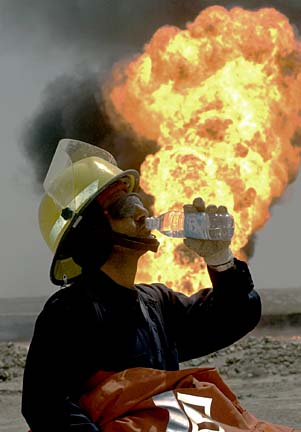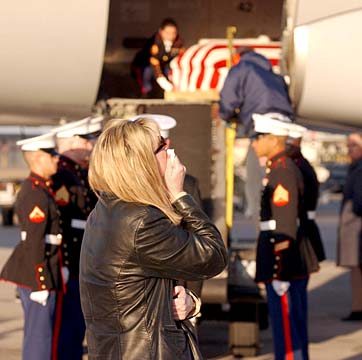
[ WAR IN IRAQ ]
ASSOCIATED PRESS
A wounded Iraqi soldier is carried to an ambulance today by U.S. Navy medics near Diwaniyah in south central Iraq.
Coalition battles Warplanes pummelled Republican Guard units defending Baghdad on Tuesday and U.S. and British ground forces attacked Iraqi positions in key southern cities, around-the-clock combat clearing the way for an assault on Saddam Hussein's capital.
to clear the way for
assault on Baghdad
By David Espo
Associated PressSaddam summoned his country - via a spokesman - to a "jihad," or holy war, against the invaders. But American and British officials used the occasion to raise fresh doubts about the fate of a man seen in public only on videotape since the war began.
Marines staged a nighttime raid on Nasiriyah, a column of amphibious assault vehicles rolling into town under a moonless sky - and finding Iraqis had abandoned a huge, walled police compound.
In Basra, a city of 1.3 million, warplanes dropped 500-pound and 1,000-pound laser-guided bombs on an Iraqi intelligence complex in an effort to dislodge die-hard defenders who have kept British forcees at bay for days.
Warplanes unleashed a thunderous nighttime barrage against Republican Guard units positioned around Karbala, about 50 miles from the capital.
"What you're seeing today on the battlefield in Iraq is a continuation of prepping the battlefield for a major encounter with the Republican Guard," said Navy Capt. Frank Thorp.
ASSOCIATED PRESS
Karem Mohammed weeps over the bodies of his family today -- including his six children, wife, mother and father -- killed by coalition air raids over Al Hillah, south of Baghdad.
Commanders refused to say when that might come, but senior American officials said the ceaseless pounding on Saddam's elite Republican Guard was taking its toll. "Some of them have been degraded to pretty low percentages of combat capability, below 50 percent in ... at least two cases, and we continue to work on them," Gen. Richard Myers, chairman of the Joint Chiefs of Staff, said at the Pentagon.
Iraqi leaders flashed defiance.
Despite the summons in the name of Saddam, British officials said two would-be suicide attackers had turned themselves in to troops in Umm Qasr voluntarily. "They didn't want to be suicide bombers any more," said British Col. Steve Cox. "We are accommodating them."
Other British and American officials said there was a growing list of examples of Iraqi civilians shedding their initial reluctance to assist forces fighting Saddam's regime.
The troops worked to win the trust of Iraqis, keeping in mind that many still recall promises of liberation in the 1991 Gulf War, only to find Saddam's forces returned unhindered when coalition forces withdrew.
Lights went on for the first time in weeks in the port city of Umm Qasr, firmly under British control. Some British forces in southern Iraq were wearing berets in public, shedding their more warlike helmets in areas deemed safe.
The American and British bombing was constant - large explosions reverberated around Baghdad - punctuated by a series of small ground engagements an a sweeping arc to the south.
ASSOCIATED PRESS
Kuwaiti firefighter Ahmed Ali drank water today near an oil well fire at Rumailah oil field, southern Iraq. Kuwaiti and American firefighters are putting out blazes at six oil wells that were sabotaged, reportedly by retreating Iraqi forces.
A Marine official said heavy bombing was carried out around Kut, southeast of Baghdad, adding that ground forces have secured an air base further to the south, at Qalat Sukkar, that could be used as a staging ground.
Further to the southwest, Marines claimed to have killed at least 80 Iraqi soldiers and taken dozens of prisoners in fighting near Diwaniyah. According to reports from the field, troops on a reconnaissance mission found fortified Iraqi positions along a line leading several miles to the city.
"They were shooting from buildings, from dugout positions, from holes, from everywhere," Cpl. Patrick Irish said of the Iraqis.
Marines took no chances with prisoners, bulldozing a pit, then surrounding it with barbed wire. Before a POW was put inside, he was blindfolded and searched, one Marine pinning down his feet, another his arms, and a third pointing an M-16 rifle at his head.
In northern Iraq, U.S. special forces troops trumpeted their role in a successful joint effort with Kurdish fighters to rout Ansar al-Islam militants accused of having ties to al-Qaida terrorists.
One day after American forces killed at least seven civilians at a checkpoint, Iraqi officials said U.S. Apache helicopters attacked a neighborhood in the central Iraq city of Hillah, killing 33 people and injuring more than 300.
The U.S. Central Command said it was investigating, but said no Apaches could have been involved in any incident.
ASSOCIATED PRESS
Amanda Jordan awaited the arrival of the flag-draped casket of her husband, Marine Gunnery Sgt. Philip Andrew Jordan, at the airport in Windsor Locks, Conn., yesterday. Jordan, 42, was killed in action last week in Nasariyah, Iraq, while attached to the 2nd Marine Division, based in Camp Lejeune, N.C. His funeral is tomorrow.
At the Pentagon, Rumsfeld and Myers, the nation's top uniformed officer, emphatically defended the American battle plan, which has sparked controversy.
"Forces are coming (toward Baghdad) from the north, they're coming from the south and they're coming from the west, and the circle is closing" on Saddam, Rumsfeld said.
Myers and Rumsfeld both said some Republican Guard units had been repositioned from north of Baghdad to offset losses suffered by units in the south.
Responding to a suggestion from a Saudi official that Saddam step down to spare his country, Iraqi Vice President Taha Yassin Ramadan replied: "Go to hell."
And in a speech read in Saddam's name, Information Minister Mohammed Saeed al-Sahhaf urged Iraqis to wage a holy war against U.S.-led forces. "Strike at them, fight them. They are aggressors, evil, accursed by God, the exalted. You shall be victorious and they shall be vanquished."
"It does seem very strange that he hasn't appeared at this time," said a British spokesman in London.
Saddam has been shown in a series of videotaped appearances on Iraqi television during the war, but has made no known public appearances since the night of March 19, when American missiles hit a complex in Baghdad where he and his two sons were believed to have been sleeping.
In Nasiriyah, where American forces have met stiff resistance, Brig. Gen. Vincent Brooks said civilians were helping U.S. special forces stage raids and find troops loyal to Saddam.
Marines were aided by 100 tribal fighters who helped battle Iraqi forces and remove explosives from a bridge north of the city, and their help also resulted in the capture of POWs, he said.
Hawaii military links and information



